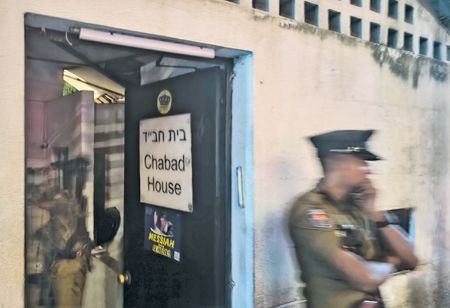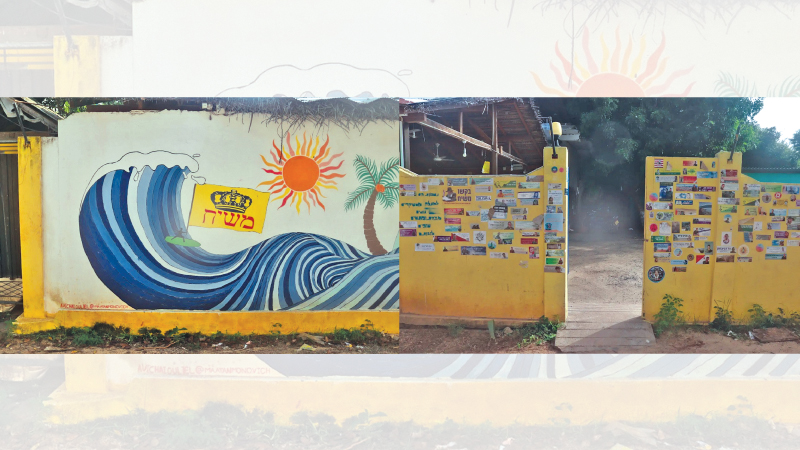In the quiet surf town of Arugam Bay on Sri Lanka’s East coast, nestled among coconut trees and backpacker cafes, a small building with a mural of Hebrew lettering on its wall has stirred a national debate since the Israeli onslaught on Gaza. It is one of several Chabad Houses, religious centres operated by the global Chabad-Lubavitch Jewish Movement which was established in Sri Lanka in 2005. While they serve as spiritual homes and community centres for Jewish tourists, particularly from Israel, questions have surfaced about their legality, transparency, and the broader implications for Sri Lanka’s immigration and foreign policy.
 Chabad Houses, common in tourist destinations from Goa to Bangkok, offer religious services, kosher food, and support for Jewish travellers. Their presence in Sri Lanka, however, remained largely unnoticed until 2023, when local media reported that Chabad centres had been set up in Arugam Bay and Colombo. These institutions, alleged by locals to be illegal places of worship, play an important role in the Chabad-Lubavitch Jewish Movement. Attracting many Israeli Jewish tourists, some of whom are recently demobilised military personnel. Some with active warrants for carrying out war crimes.
Chabad Houses, common in tourist destinations from Goa to Bangkok, offer religious services, kosher food, and support for Jewish travellers. Their presence in Sri Lanka, however, remained largely unnoticed until 2023, when local media reported that Chabad centres had been set up in Arugam Bay and Colombo. These institutions, alleged by locals to be illegal places of worship, play an important role in the Chabad-Lubavitch Jewish Movement. Attracting many Israeli Jewish tourists, some of whom are recently demobilised military personnel. Some with active warrants for carrying out war crimes.
The four Chabad Houses in Colombo, Arugam Bay, Ella and Weligama are operated by Chabad House Arugam Bay (Pvt.) Ltd which has been registered under the Sri Lanka Companies Act No 17 of 1982. However, the more recent outpost in Arugam Bay, according to local authorities, was built without official approval. The Government has since come under fire for allowing the unregulated spread of such religious establishments.
Country Manager of Chabad Arugam Bay Kapila Rajapaksa told the Sunday Observer that misinformation surrounding the Chabad Houses in Sri Lanka has put the country, the tourism industry and Jewish tourists in a precarious position.
“The Chabad House is not a synagogue. They serve as a community centre for Jewish tourists visiting Sri Lanka to celebrate important Jewish celebrations in their calendar,” said Rajapaksa.
However, he said that each Chabad House in Sri Lanka has a Rabbi (a Jewish priest) to lead the tourists in prayer and service during Jewish celebrations such as the Passover or the Jewish New Year. The Chabad House also hosts the Chabad Night every Friday in keeping with their faith, where Jewish tourists gather for dinner and prayer.
Rajapaksa also said that the Chabad Houses take on the responsibility of ensuring Jewish tourists have access to Kosher food (food prepared according to Jewish law) at the Chabad House. While most of the fresh produce is locally sourced all other supplies are brought down from Israel. As Sri Lanka does not have a state sanctioned Kosher certification method, the Chabad Arugam Bay (Pvt) Ltd brings down senior Rabbis from Israel and Australia to selected slaughter houses in the country. With the help of the global Chabad Housel network, these senior Rabbis would then carry out slaughtering of the animals and processing of the meat, with the support of local labourers.
In March 2025, one such Kosher slaughterhouse in Mirigama linked to the Colombo Chabad House was raided by the Department of Immigration and Emigration after it intensified checks on Chabad operations. Several foreign Rabbis were detained for working under tourist visas. A clear breach of Sri Lankan immigration law, which does not permit foreign nationals to conduct paid or structured religious work while on tourist permits.
Rajapaksa, himself, was working in a poultry company for over 20 years when Rabbis who set up the Chabad House in Colombo approached him through a mutual friend trying to find a Kosher friendly poultry supplier. Rajapaksa, a resident of Kandy, now moves between the Chabad Houses carrying out recruitment of service staff, providing training and coordinating with local authorities with regards to the Chabad House operations.
According to Rajapaksa, the Rabbis working in the slaughter houses are not the only Rabbis who work in Sri Lanka on tourist visas.
“When we opened the Chabad House in Ella in October 2023, a senior Rabbi from Israel came down to carry out the establishment and management of operations in Ella. They came on a tourist visa.” said Rajapaksa. He said that Rabbis visit the country on a rotation basis, some serving at a Chabad House for a few months and sometimes for several years.
Rajapaksa insists that neither Chabad Houses nor the Rabbis are engaged in religious conversions or jewish missions in Sri Lanka. However, according to a Facebook post uploaded by the Chabad of Sri Lanka Facebook page, Rabbis operating from the Chabad Houses seem to have acted otherwise. The post details with pictures of how Rabbis have seeked out Israeli bhikkhus practising forest monastic traditions in isolation and attempted to reconvert the bhikkhus to Judaism.
“Israel has a close relationship with Sri Lanka. If we go against the Israeli tourists we are also attacking the European market. Consul for Israel in Sri Lanka Dinesh Rodrigo has been helping us a lot with the Chabad House operations,” said Rajapaksa.
Illegal businesses and tourist visas
According to Rajapaksa, the Chabad Houses have become an integral part of Jewish tourists arriving in Sri Lanka, where Rabbis and the Chabad House staff provide information on Jewish friendly accommodation, tour guides, Kosher friendly restaurants and cafes.
“The majority of Israeli tourists arriving in Sri Lanka come straight to the Chabad House from the airport. They have some coffee with our Rabbis and we guide them. The Chabad House promotes Sri Lanka as a safe place for Jewish tourists,” said Rajapaksa.
 However locals say that the Chabad House, while promoting Sri Lanka for Israeli tourists, has become an obstacle to the local tourism industry. Kumar, who operates a cafe and works as a tour guide in the Southern coastal belt said that the Chabad House connects these travellers with Israelis who operate businesses illegally under tourist visas. Kumar said that from cafes, restaurants to tour guides and yoga instructors many locals have to now compete with Israelis.
However locals say that the Chabad House, while promoting Sri Lanka for Israeli tourists, has become an obstacle to the local tourism industry. Kumar, who operates a cafe and works as a tour guide in the Southern coastal belt said that the Chabad House connects these travellers with Israelis who operate businesses illegally under tourist visas. Kumar said that from cafes, restaurants to tour guides and yoga instructors many locals have to now compete with Israelis.
“The Chabad House connects them to Israelis. Not Sri Lankans. They have their own Whatsapp groups where the services are advertised. They transfer the payments online to Israeli banks. They use our beach and our nature, but the money goes to Israel. Not to us,” said Kumar.
Kumar’s sentiments are shared by many establishments and entrepreneurs in the South who say that the Israeli tourists have had a more negative impact on the tourism industry than a positive one.
Legal experts highlight a gap in how Sri Lanka monitors foreign religious organisations. While the country guarantees freedom of religion under its Constitution, any religious institution, especially those tied to foreign entities, must comply with local building codes, zoning regulations, and immigration laws.
According to immigration officials, many of the Chabad centres were registered as private businesses or community organisations rather than religious institutions. This has complicated enforcement, as some activities, like the provision of Kosher meals or holiday gatherings are difficult to distinguish from regular tourism services.
“What we are seeing is not a question of religion, but of regulatory evasion,” said an immigration official who spoke on condition of anonymity. “Foreign nationals are conducting organised services, hiring staff, importing religious materials, and even managing commercial operations, all without the appropriate licenses or visas.”
The debate around Chabad Houses intensified further when the U.S. State Department issued a travel alert in early 2025, warning of a potential threat to Israeli-linked sites in Arugam Bay. In response, Sri Lankan police deployed armed officers to guard the local Chabad House. Similar security arrangements were later made for the Colombo Chabad House, following a candle light vigil held earlier this month calling for an end of the genocide in the Gaza strip.
Religious freedom vs regulatory compliance
The situation exposes a deeper fault line: how should a multi-cultural, tourism-dependent country manage the influx of religiously motivated organisations without undermining its legal and diplomatic frameworks?
Sri Lanka does not have a dedicated legal structure to register or regulate foreign religious institutions. While mainstream churches and temples operate with oversight from local authorities, newer or foreign-based movements often fall through the cracks. Chabad Houses, by design, operate as decentralised community centres rather than formal religious institutions, complicating Government oversight. Legal analysts said that this case should prompt a broader review of visa categories and religious registration procedures. A new framework, they say, is necessary to distinguish between legitimate religious tourism and activities that verge on illegal occupation or diplomatic sensitivity.
Human rights lawyer and pro-Palestinian activist Swastika Arulingam told the Sunday Observer that the Government has a responsibility to keep track of illegal activities carried out by foreigners on tourist visas. She said that simply because such practices have been continuing for decades it does not become legal as such operations does not constitute customary law.
She said that Chabad Houses must be monitored as they are directly linked to the Government of Israel. According to her, as a country whose official stance on the Palestinian question is a free Palestine, Sri Lanka should not allow such establishments which are propagating Zionism on Palestinian land.
“Most of those who come to the Chabad Houses have served in the IDF and some even have committed war crimes. They have no respect for local communities, and often insult local cultures.
They have segregated Zionist parties and events which are exclusive to Israelis. How can we continue to allow such persons to use the Chabad House as a conduit?” asked Arulingam.
Sovereignty over tourism
The Government has pledged to review the legal status of all foreign religious institutions currently operating in Sri Lanka. Officials have also spoken of forthcoming amendments to immigration laws to close loopholes that allow religious or commercial activity under tourist visas.
In the meantime, the fate of the Chabad Houses remains uncertain. While no closures have been officially announced, increased scrutiny and public attention show that the authorities are treading cautiously.
Sri Lanka’s encounter with the global Chabad Movement encapsulates a modern dilemma: how to remain open to faith, culture, and tourism, while preserving the rule of law and foreign policy neutrality. The outcome of this debate may set a precedent not just for religious regulation, but for how Sri Lanka defines the boundaries of its sovereignty in an increasingly interconnected world.






